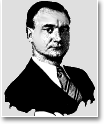Rudy Seiger - Fairmont Hotel Orchestra Leader
 Rudy Seiger is a boy from the city who remained in the city and made good. He was
born in San Francisco about forty years ago. Four years later his father placed
a fiddle in his tiny hands and began instructing him in its possibilities. Since
then he has learned so much of its possibilities that he can't be happy without
it for more than two days at a time. Rudy Seiger is not Rudy Seiger without Rudy
Seiger's violin.
Rudy Seiger is a boy from the city who remained in the city and made good. He was
born in San Francisco about forty years ago. Four years later his father placed
a fiddle in his tiny hands and began instructing him in its possibilities. Since
then he has learned so much of its possibilities that he can't be happy without
it for more than two days at a time. Rudy Seiger is not Rudy Seiger without Rudy
Seiger's violin.
When Rudy was a serious, thoughtful lad of seven years he was very successfully
managing violin solos. Already his life had begun to depend upon the little wooden
box for happiness and achievement. At fourteen he was able to earn his living with
it besides. In fact, one year later the records show that Master Rudy Seiger was
director of the orchestra at the old Grand Opera House. He is a tall man now, nearly
six feet. But in those days his height was still in transit and he was compelled
to stand on a chair to direct.
We inquired about the teachers who succeeded his father and he spoke first of Karl
Von der Mehden. The Von der Mehdens were a well-known
German family that contributed much to the musical life of San Francisco
during the score of years before the [1906 earthquake and] fire. He also
studied with August Heinrichs, Julio Minetti and William Hoffman. Ormay
aided him in mastering the piano. His one brother learned to play the piano
also, though he did not take up music professionally. His one sister and his
mother were not musically inclined.
An artist has two personalities. The one he puts into his work and the one
that he exhibited in the flesh. It is seldom that a man is remarkable for
both. Rudy Seiger is loved both as an artist and a man.
He told us that he is extremely fond of California, that he cannot bear to be
away from his native state for long. It developed that he had principally in
mind San Francisco, and in San Francisco his affections center around the
Fairmont Hotel. He has been pretty much a part of the Fairmont Hotel since
1907 when he registered there with his fiddle for the first time. Since 1909
he has led the hotel's orchestra. The long stay is revealing of the man's
character. He has made such a home of the hotel that he would be sorely
missed were he to accept one of his many offers to go elsewhere. It is
because he has such an affection for people, so much tolerance and
friendliness about him and such inwardly quiet and studious nature that he
had fitted in so perfectly in such a large institution.
He lost his wife during the post-war flu epidemic and has not remarried.
He has one son in his early teens. Rudy Seiger has a mind that roves widely
in its search for the fundamental concepts of living. He is not a man of strong
likes and dislikes, nor does he lean overwhelmingly toward any single philosopher
or school of philosophy--he takes something from all of them. Among the
moderns he reads James, Shaw, Wells and Bertrand Russell. Biography and history
he likes. Fiction doesn't interest him. Shakespeare he enjoys reading over and
over again. The modern poets, apparently, have nothing for him; poetry must sing
in the manner of the great lyrical poets to engage his interest. He adds music
to the lines of Keats. Browning and Burns as he recalls them. Rudy Seiger's
nature suggests that he would be fond of country life. The country is very
dear to his heart.
He owns a small ranch near Mt. Diablo, in Contra Costa County, where he goes for
vacation periods. Instead of hunting and fishing, however, he spends the days
hiking and working in the garden. This is characteristic of the man.
Broadcast Weekly
San Francisco, April 4, 1931
Return to the Museum of the City of San Francisco.
|